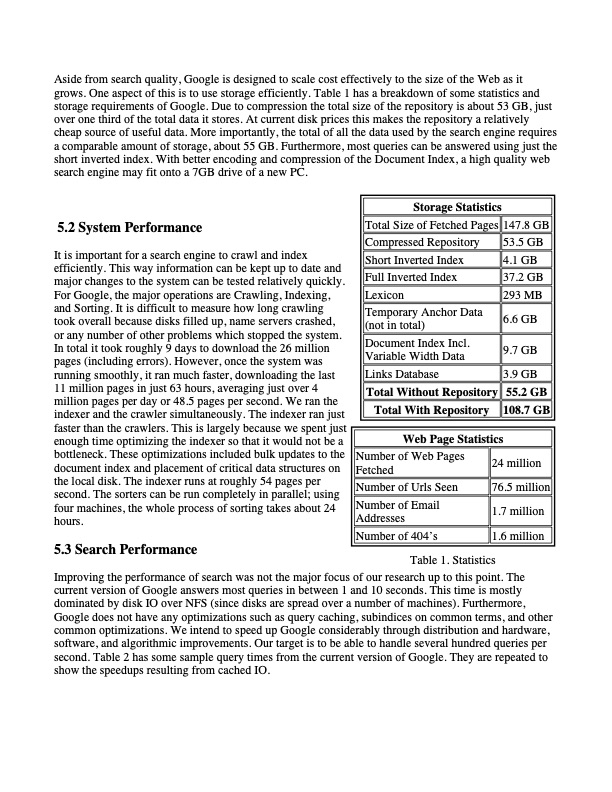
PDF Publication Title:
Text from PDF Page: 014
Aside from search quality, Google is designed to scale cost effectively to the size of the Web as it grows. One aspect of this is to use storage efficiently. Table 1 has a breakdown of some statistics and storage requirements of Google. Due to compression the total size of the repository is about 53 GB, just over one third of the total data it stores. At current disk prices this makes the repository a relatively cheap source of useful data. More importantly, the total of all the data used by the search engine requires a comparable amount of storage, about 55 GB. Furthermore, most queries can be answered using just the short inverted index. With better encoding and compression of the Document Index, a high quality web search engine may fit onto a 7GB drive of a new PC. Storage Statistics Total Size of Fetched Pages 147.8 GB Compressed Repository 53.5 GB Short Inverted Index 4.1 GB Full Inverted Index 37.2 GB Lexicon 293 MB Temporary Anchor Data (not in total) 6.6 GB Document Index Incl. Variable Width Data 9.7 GB Links Database 3.9 GB Total Without Repository 55.2 GB Total With Repository 108.7 GB 5.2 System Performance It is important for a search engine to crawl and index efficiently. This way information can be kept up to date and major changes to the system can be tested relatively quickly. For Google, the major operations are Crawling, Indexing, and Sorting. It is difficult to measure how long crawling took overall because disks filled up, name servers crashed, or any number of other problems which stopped the system. In total it took roughly 9 days to download the 26 million pages (including errors). However, once the system was running smoothly, it ran much faster, downloading the last 11 million pages in just 63 hours, averaging just over 4 million pages per day or 48.5 pages per second. We ran the indexer and the crawler simultaneously. The indexer ran just faster than the crawlers. This is largely because we spent just enough time optimizing the indexer so that it would not be a bottleneck. These optimizations included bulk updates to the document index and placement of critical data structures on the local disk. The indexer runs at roughly 54 pages per second. The sorters can be run completely in parallel; using four machines, the whole process of sorting takes about 24 hours. 5.3 Search Performance Web Page Statistics Number of Web Pages Fetched 24 million Number of Urls Seen 76.5 million Number of Email Addresses 1.7 million Number of 404’s 1.6 million Improving the performance of search was not the major focus of our research up to this point. The current version of Google answers most queries in between 1 and 10 seconds. This time is mostly dominated by disk IO over NFS (since disks are spread over a number of machines). Furthermore, Google does not have any optimizations such as query caching, subindices on common terms, and other common optimizations. We intend to speed up Google considerably through distribution and hardware, software, and algorithmic improvements. Our target is to be able to handle several hundred queries per second. Table 2 has some sample query times from the current version of Google. They are repeated to show the speedups resulting from cached IO. Table 1. StatisticsPDF Image | natomy of a Large-Scale Hypertextual Web Search Engine

PDF Search Title:
natomy of a Large-Scale Hypertextual Web Search EngineOriginal File Name Searched:
google-anatomy-of-a-search-engine.pdfDIY PDF Search: Google It | Yahoo | Bing
Cruise Ship Reviews | Luxury Resort | Jet | Yacht | and Travel Tech More Info
Cruising Review Topics and Articles More Info
Software based on Filemaker for the travel industry More Info
The Burgenstock Resort: Reviews on CruisingReview website... More Info
Resort Reviews: World Class resorts... More Info
The Riffelalp Resort: Reviews on CruisingReview website... More Info
| CONTACT TEL: 608-238-6001 Email: greg@cruisingreview.com | RSS | AMP |